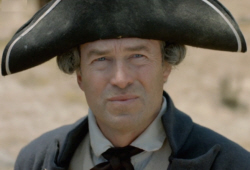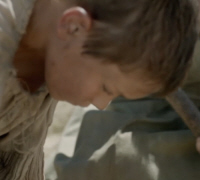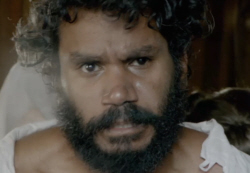Aboriginal Assimilation
Transported to Australia
Andrew Marr’s History of the World - Age of Revolution

Across the Channel, Britain’s political rulers were horrified by the French Revolution. The British had very different ideas about liberty, and would fight long wars at sea and on land against Napoleon to defend them. But the highest ideals of the British Enlightenment would also fail to measure up as they explore the world and encountered new peoples.
The Australian aborigines were nomadic hunter-gatherers. In the 18th century, there were up to a million of them, with around 250 different languages.
They’d lived here for perhaps 50,000 years. The rest of human history wasn’t even a rumour. Then strange white creatures turned up.
In 1770, Captain James Cook had discovered New South Wales and claimed it for Britain. A brilliant navigator, Cook came from a humble background and he greatly admired the natives for their lack of material greed. “They have no need of magnificent houses is and household stuff,” he wrote, and with a wonderful climate, they had no need of clothing. Noble savages. But Cook was a servant of the British Crown, and after the loss of her American colonies, Britain desperately needed somewhere else to dump her convicts.

The first European settlement in Australia was a prison camp. It was named after the British Home Secretary, Viscount Sydney. But this was also an Enlightenment project. Britain had some 200 crimes punishable by death. The hanging of hundreds of people, including women and children, was making an enlightened society queasy. Sending convicts overseas seemed more humane. And so there came to Australia people like Elizabeth Powley, who’d stolen a few shillings worth of bacon and raisins. And James Grace, who’d taken ten yards of ribbon and a pair of silk stockings. He was 11-years-old.

In fact, he had personal instructions from King George III himself, who wanted all our subjects “to live in amity and kindness” with the natives.
Unable to persuade the Aborigines to make contact with them, Phillip tried something which wasn’t perhaps so kind - kidnap. The kidnapped man was a 26-year-old called Bennelong. Phillip wanted to teach him English so he could communicate directly with the aborigines.
Bennelong became a go-between, linking two different worlds. He entertained the British with his sense of humour and his singing and his dancing, and he introduced Gov Phillip to the language and the customs of his people. And in return, Philip popped him English and polite manners. And something perhaps rather unexpected happened between these two very different men. They became genuine friends.

On Christmas Day, 1789, Bennelong dressed up in the official uniform of the British Navy and enjoyed a Christmas dinner of turtle with Captain Phillip. But after six months, Bennelong went missing. It took Phillip four months to track him down.
Bennelong agreed to return but first, Aboriginal custom demanded an act of revenge against his kidnapper.
Quite remarkably, Governor Phillip did not retaliate. He understood why he’d been attacked, and his friendship with Bennelong resumed. Bennelong rejoined him in Sydney. The British even built Bennelong his own house. It stood in the same site that Sidney Opera house now occupies.

Bennelong was the first aboriginal man to voluntarily enter the British settlement. But he’d be followed by many more. It’s remembered as the ‘Coming In’, and to start with, it seemed like a great Enlightenment triumph.
The British colony kept on growing. Some 165,000 convicts were sent before the system ended in 1850. But this was disastrous for the aborigines. Many became hooked on alcohol and tobacco. An estimated 20,000 aborigines were killed in battles over land. Tens of thousands more were killed by European diseases.
Wherever Enlightenment Europeans came across hunter-gatherers, they moved remarkably quickly from regarding them with curiosity and awe to seeing them as human clutter. As soon as greed and patriotism kicked in, they were simply to be marginalised, pushed aside, even exterminated. It’s very hard to understand somebody else’s culture when you’re busy taking away their land.
